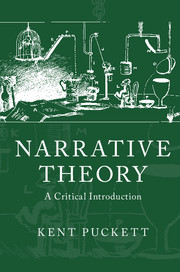Book contents
- Frontmatter
- Contents
- Acknowledgments
- Chapter 1 Introduction: Story/Discourse
- Chapter 2 Action, Event, Conflict: The Uses of Narrative in Aristotle and Hegel
- Chapter 3 Lost Illusions: Narrative in Marx, Nietzsche, and Freud
- Chapter 4 Epic, Novel, Narrative Theory: Henry James, Georg Lukács, Mikhail Bakhtin, and Erich Auerbach
- Chapter 5 Form, Structure, Narrative: Propp, Shklovsky, Saussure, Lévi-Strauss
- Chapter 6 Narratology and Narrative Theory: Kristeva, Barthes, and Genette
- Bibliography
- Notes
- Suggested Further Reading
- Index
Chapter 3 - Lost Illusions: Narrative in Marx, Nietzsche, and Freud
Published online by Cambridge University Press: 01 December 2016
- Frontmatter
- Contents
- Acknowledgments
- Chapter 1 Introduction: Story/Discourse
- Chapter 2 Action, Event, Conflict: The Uses of Narrative in Aristotle and Hegel
- Chapter 3 Lost Illusions: Narrative in Marx, Nietzsche, and Freud
- Chapter 4 Epic, Novel, Narrative Theory: Henry James, Georg Lukács, Mikhail Bakhtin, and Erich Auerbach
- Chapter 5 Form, Structure, Narrative: Propp, Shklovsky, Saussure, Lévi-Strauss
- Chapter 6 Narratology and Narrative Theory: Kristeva, Barthes, and Genette
- Bibliography
- Notes
- Suggested Further Reading
- Index
Summary
The curtain rose again, a lantern was lowered from the ceiling, and firemen and stage carpenters departed on their rounds. The fairy scenes of the stage, the rows of fair faces in the boxes, the dazzling lights, the magical illusion of new scenery and costume had all disappeared, and dismal darkness, emptiness, and cold reigned in their stead. It was hideous.
Honoré de Balzac, Lost IllusionsI argued in the last section that Hegel is important to narrative theory for a few reasons. I suggested that Hegel sought to engage with the two great events of his early intellectual life – his encounter with Kant and the fact and idea of the French Revolution – in terms of a philosophical system that depended on narrative form (a relation between story and discourse) in order both to link aspects of life that a previous generation of philosophers took as fundamentally different in kind and to imagine a version of history that could make productive sense of historical events that would otherwise seem hateful or absurd. Dennis Schmidt writes that Hegel's “turn to the topic of tragedy, now in order to develop a theory of the tragic” – and, I would add, a theory of narrative – “has above all these dual motivations: the effort to think through the end of philosophy as metaphysics, which Kant first made a necessary concern, and the effort to think the radical transformation in history and the idea of freedom that is announced by the French Revolution.” First, Hegel's narrative method thus allowed him to imagine an ultimate synthesis of ideas and things, form and content, a synthesis that Kant and others saw as impossible; and, second, imagining history not as a series of unrelated events but rather as a whole and organic system governed by a single dialectical logic allowed him to see events such as the French revolutionary Terror of 1793 as something other than a waste of life, time, and potential. Thinking of history as an encounter between the experience of life as it mysteriously unfolded and the idea of life as a whole, intentional, and significant plot gave Hegel a way both to understand the consequence of an otherwise tragic divide between freedom and necessity and to treat history and its various contents as available to analysis and interpretation.
- Type
- Chapter
- Information
- Narrative TheoryA Critical Introduction, pp. 76 - 119Publisher: Cambridge University PressPrint publication year: 2016



